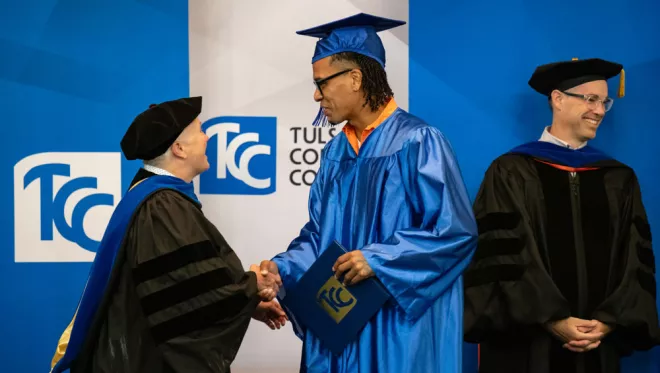Corrections Education Program Awards College Degrees Behind Bars

Published
The prison’s chapel serves as the graduation venue and each man walks in wearing a cap and gown over their orange prison uniform with pomp and circumstance playing in the background.
The men in attendance are graduating from Tulsa Community College through its long-standing Corrections Education program. This year, the annual commencement ceremony recognized 14 men who earned a college degree, including five who earned two degrees.
“Education has the power to transform. We know it can for individuals and for society,” said Dr. Angela Sivadon, TCC senior vice president and chief academic officer. “As TCC is focused on developing the workforce through education, our ultimate goal is to help individuals who have been incarcerated get jobs and support their families when they are released.”
In partnership with the Oklahoma Department of Corrections, the TCC Corrections Education program has offered college courses at Dick Conner Correctional Center in Hominy prison since 2007. The courses are taught by TCC faculty with creative modifications due to the environment such as no internet access and altered science labs to meet prison safety standards.
“TCC has long been a leader in this area and been recognized nationally for the work including the College’s selection in 2016 for the Second Chance Pell pilot, in partnership with the U.S. Department of Education,” said Ramona Curtis, TCC director of workforce development. “That pilot, and the resulting data, helped clear the way for new federal regulations to reinstate Pell Grant eligibility to incarcerated students.”
Cody Zimmer knows from experience what education can do for an individual who has been incarcerated. Released from prison in 2022, he earned two degrees and three certificates from TCC while at Dick Conner Correctional Center.
“If I've learned anything since leaving these walls, I've learned that I have to own my story,” said Zimmer, as this year’s commencement speaker, to the men sitting where he used to sit.
He now has a full-time job with a recent promotion and by sharing his story and experience, he hopes to set an example for these men to follow.
“I will never forget the person I was, the choices I made, and the family and individual who were so gravely impacted by me,” said Zimmer. “I can't change the past and I certainly don't want to live in it, so I try to live in the present by making every day meaningful. You can do the same, right now. Own your past, and through your actions, control your future.”
The Second Chance Pell pilot showed education reduced recidivism rates among participants. The Vera Institute of Justice says incarcerated people who participate in postsecondary education programs are 48 percent less likely to return to prison than those who do not, and the likelihood of recidivism decreases as incarcerated people achieve higher levels of education. In addition, this means that every dollar invested in prison-based education yields four to five dollars in taxpayer savings from reduced incarceration costs.
The TCC has awarded more than 500 certificates and degrees since the Corrections Education program started 15 years ago.
